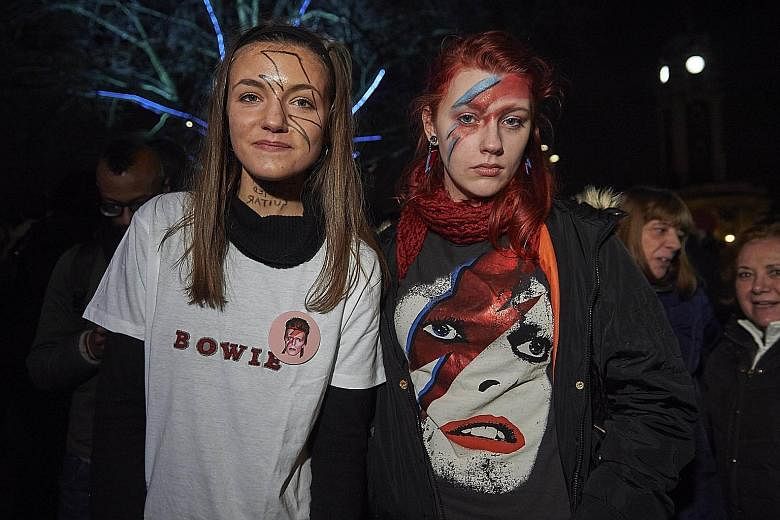NEW YORK • In the video for David Bowie's Lazarus, released last week, the rock 'n' roll shape-shifter, ever thin but bordering on gaunt, is blindfolded and writhing in a hospital bed.
"Look up here, I'm in heaven," he sings. "I've got scars that can't be seen." In the end, a shaking Bowie retreats into a darkened armoire.
Bowie, who in his career reimagined the worlds of pop music, art and fashion, told very few people about the cancer that preceded his death on Sunday, at 69, 11/2 years after his diagnosis.
Even those working closely with him on a sudden burst of new projects were surprised to learn he had been dying.
At the same time, it turns out, he was telling everyone through his art.
In recent months, after years of relative silence, he went on a prodigious streak, inspired in part by his fading health, said those who knew. Among his formidable artistic output were Blackstar, his jazz-inspired final album, and two epic music videos that addressed death head-on.
Only now, with hindsight, does the scope of his oracular farewell become clear: His latest works were haunting, conflicted and not entirely subtle - both the off- Broadway show he co-wrote and a new song are named Lazarus, for the biblical figure brought back from the dead.
James C. Nicola, artistic director of New York Theatre Workshop, where Lazarus runs through Jan 20, said: "What seemed not too long ago intriguingly complicated, ambiguous and opaque now seems pretty clear: a man who was yearning for immortality."
During his life, Bowie pushed his music relentlessly forward while reinventing himself as many personae - from Davie Jones, a young rhythm and blues singer from the London neighbourhood of Brixton, to the interplanetary pop star Ziggy Stardust and the dapper hedonist Thin White Duke.
He explored androgyny and other worldliness and sampled cultures from different continents (and galaxies) as his musical and visual palettes continued to evolve, always theatrical and deeply layered until his focus turned to his own looming end.
But while laying bare his demons for an audience, he kept much of his life private, even after his death.
Bowie's family and representatives have opted not to disclose what kind of cancer he had or where he died, preferring to let the icon speak, however abstractly, through the thinly veiled characters in his work, all versions of himself.
"The production of Lazarus and also the new album, Blackstar, when you look at them both, you find so many lines and phrases that meant so much more than people knew before today," said Ivo van Hove, the musical's director, one of a few with knowledge of Bowie's condition. "It's like two testaments," he said.
The singer's recent collaborators described his work ethic as tireless throughout his last phase, which included simultaneous work on the album, its accompanying videos and the theatre production, a non-traditional sequel to The Man Who Fell To Earth, the novel that inspired his 1976 film.
Van Hove said Bowie told him he was sick in November in 2014, via Skype, when the show was in its early stages, but requested the information remain strictly confidential. (The director said in a Dutch radio interview on Monday that Bowie had liver cancer.)
"It was immediately clear it was very serious," van Hove said, though he kept his word and did not tell the cast - including Michael C. Hall, who stars as the extraterrestrial Bowie stand-in, Thomas Jerome Newton. "Confidential is confidential."
In yet another of his frequent, career-defining reinventions, Bowie recruited the Donny McCaslin Quartet, a jazz combo, to work on Blackstar, an ambitious work addressing mortality that was released only last Friday - Bowie's birthday. He had enlisted the musicians as his latest backing band after a low-key scouting mission to hear them play at 55 Bar in Greenwich Village last year.
McCaslin said he recorded with Bowie "essentially from 11 to four every day" early last year during his illness. "What I didn't know is he was then going to Henry Hey's place and working on Lazarus," he said, referring to the show's music director.
Bowie "was just living life to its fullest - fully engaged in the moment, fully engaged in his art", he added through tears.
For others, such as van Hove, Bowie's final bow was on the opening night of Lazarus last month. "He came whenever he could," he said of the production. "Sometimes, he sent me an e-mail - 'I've had a bad day' - but he was very close to the whole process."
Robert Fox, a British producer who helped finance the show, said: "Even if he wasn't in the room, he was on the telephone, he was on Skype, he was on FaceTime or wherever he could be to be involved."
But van Hove said that on opening night, Bowie was "very fragile". "I knew that evening - I felt it deeply - that this would be the last time I see him."
A frail but pleased Bowie took in the show, greeted the cast and even appeared on stage, beaming in a T-shirt and blazer, for a curtain call. He was too tired to make the after-party.
Meanwhile, tickets for a concert at New York's Carnegie Hall and in honour of Bowie sold out on Monday after it was announced, as sales of his albums soared.
The March 31 concert will feature performers such as Cyndi Lauper, Perry Farrell of rock band Jane's Addiction and indie rockers The Mountain Goats.
Sales and streaming of Blackstar and Bowie's older albums soared on Monday, rising to the top of Apple's iTunes charts in the United States and Britain. Streaming service Spotify said streams of his music were up 2,700 per cent on Monday.
NEW YORK TIMES, AGENCE FRANCE-PRESSE




